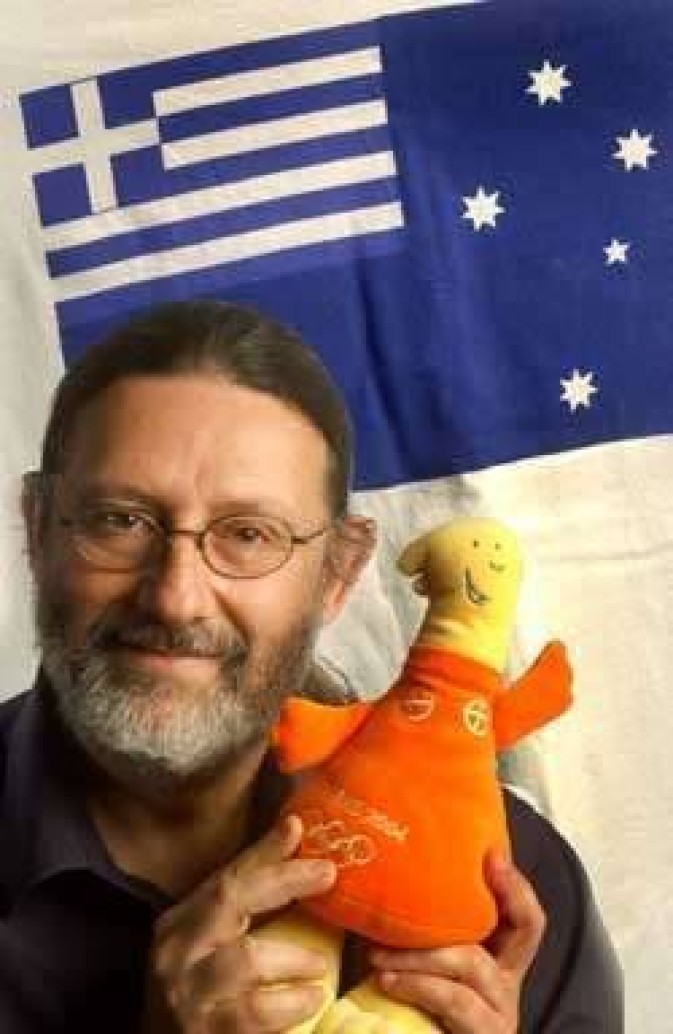Leonard Janiszewski. Indefatigable Kytherian-Australian, and Greek-Australian historian and researcher. Macquarie University, Sydney.
Leonard, accompanied by Athens Olympic mascot and a Greek-Australian flag??
From, Macquarie University News, September, 2004.
Image and text, re-published here with kind permission from the Media Manager: Kathy Vozella.
Greek heroes
There is a popular saying amongst Greeks: "Where ever you find a rock, if you turn it over, there'll be a Greek under it!" No, writes Leonard Janiszewski, the statement is not intended to suggest that countless Greeks have been stoned to death - although in the lead-up to the 2004 Olympic Games in Athens, the Australian media did appear to have relished hurling heavy criticism upon Greece's preparations. Rather, it means that the Greek Diaspora has succeeded in successfully migrating and settling in all four corners of the globe.
Leonard Janiszewski
Indeed, since the third century BC, the majority of Greeks have lived outside of Greece itself. From the very early 1800s, Australia witnessed a trickle of Hellenes upon its shores. A river emerged during the gold-rush era, followed by a flood after World War II.
When Greece unexpectedly won the Euro 2004 soccer final, phenomenal crowds of jubilant Greek-Australians danced, cheered and paraded on TV screens across the country like never before. Did Australia really have so many Greeks?
The number of Australians of Greek birth or ancestry has often been put as high as 500,000. In the early hours of July 5, they collectively appeared on Australian streets, a torrent of blue and white, swirling in a sea of emotional pride. Obviously, we can now all be assured that our continent certainly does have quite a lot of rocks.
The thousands of delirious Greek-Australians who publicly celebrated Greece's victory, were simply joining the millions of Greeks across the world in joyful celebration - from Athens to New York to London and even Cape Town. After all, the last victory of international significance for Greece was when it became the first nation to inflict a military defeat upon Axis forces during World War II.
In response to that military victory, British Prime Minister Winston Churchill remarked: "Today we say that Greeks fight like heroes, from now on we will say that heroes fight like Greeks."
For Greek-Australians and the global Greek Diaspora, the soccer victory in Portugal reclaimed the essence of that remark. The Greeks had been the underdogs from the start of the competition, but despite seemingly impossible odds, had succeeded in raising the victory chalice. Moreover, the win was a morale boost for Greek pride in hosting the Athens Olympics, an international showcase which had been dogged by negative, and often harsh publicity over construction delays, security holes, budget blow-outs and profiteering.
Greek Prime Minister Costas Karamanlis crystallised the way forward following the soccer triumph: "These boys taught us a lesson as to what Greeks can do when we really believe in something, when we are united and have self-confidence, dynamism and method in achieving it."
Greek-Australians are second only to Greek-Americans in the number of volunteers from outside of Greece who will be assisting Greece's Olympic efforts - applications were received from over 100 countries with Greek populations. The strength of the pull of pride in heritage should not be underestimated.
With that strength having dramatically increased through the soccer win, together with the Greek Diaspora, and possibly (finally) the rest of the world, I cannot wait for the Olympic opening ceremony. For I'm now passionately confident that I'll be watching 'Greeks fight like heroes' and 'heroes fight like Greeks'.
Leonard Janiszewski is a Research Fellow with the Department of Modern History. Along with University photographer Effy Alexakis, he operates the 'In Their Own Image: Greek-Australians' National Project' in association with the Australian History Museum.
In Their Own Image: Greek Australians
National Research Project and Archives
Department of Modern History,
Macquarie University. NSW. 2109.
Ph: 02 9850 6886.
Fax: 02 9850 6594
Emails:
greekoz@hmn.mq.edu.au
effy.alexakis@mq.edu.au
www.austhistmuseum.mq.edu.au/greek/
The picture gallery can be accessed at:
http://www.austhistmuseum.mq.edu.au/greek/gallery.htm
An internal search on kythera-family, under Alexakis, or Janiszewski, will reveal numerous other entries by, and about these two very committed researchers.
